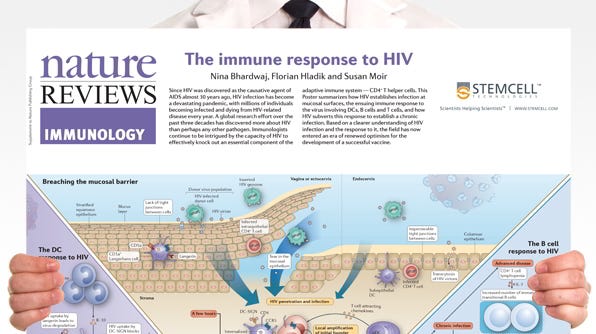Infectious Diseases and Immunology
Infectious diseases are caused by pathogens, including viruses and bacteria. Researchers aim to understand the interactions between these microorganisms and immune cells in order to develop vaccines and therapies against infectious diseases.
Below is a collection of scientific resources for your infectious disease research.
The Immune Response to HIV Poster
Nina Bhardwaj, Florian Hladik and Susan Moir. This Poster summarizes how HIV establishes infection at mucosal surfaces, the ensuing immune response to the virus involving DCs, B cells and T cells, and how HIV subverts this response to establish a chronic infection.
Get Your Free Copy >-
 Unloading the RoboSep‚Ñ¢-S CarouselBasic overview on how to use and maintain your RoboSep‚Ñ¢-S; steps to unload the instrument after a cell separation run has been completed
Unloading the RoboSep‚Ñ¢-S CarouselBasic overview on how to use and maintain your RoboSep‚Ñ¢-S; steps to unload the instrument after a cell separation run has been completed -
 Removing the RoboSep‚Ñ¢-S Carousel for CleaningBasic overview on how to use and maintain your RoboSep‚Ñ¢-S; how to remove the carousel for cleaning
Removing the RoboSep‚Ñ¢-S Carousel for CleaningBasic overview on how to use and maintain your RoboSep‚Ñ¢-S; how to remove the carousel for cleaning -
 RoboSep‚Ñ¢-S ShutdownBasic overview on how to use and maintain your RoboSep‚Ñ¢-S; how to shutdown the instrument if no more runs are planned for the day
RoboSep‚Ñ¢-S ShutdownBasic overview on how to use and maintain your RoboSep‚Ñ¢-S; how to shutdown the instrument if no more runs are planned for the day -
 Automate Cell Isolation for Up to 16 Samples with the RoboSep‚Ñ¢-16 Cell Separation InstrumentFeatures and benefits of using the fully automated cell isolation platform RoboSep‚Ñ¢-16 which allows you to efficiently isolate cells from up to 16 samples simultaneously
Automate Cell Isolation for Up to 16 Samples with the RoboSep‚Ñ¢-16 Cell Separation InstrumentFeatures and benefits of using the fully automated cell isolation platform RoboSep‚Ñ¢-16 which allows you to efficiently isolate cells from up to 16 samples simultaneously -
 SARS-CoV-2 Viral Diversity: Causes, Consequences, and OpportunitiesThe rapid spread of SARS-CoV-2 has been accompanied by the emergence of distinct viral clades, though their clinical significance remains unclear. In this webinar, Dr. Judd F. Hultquist discusses his recent data on how differences in virus genotype impact viral load and influence viral transmission and spread.
SARS-CoV-2 Viral Diversity: Causes, Consequences, and OpportunitiesThe rapid spread of SARS-CoV-2 has been accompanied by the emergence of distinct viral clades, though their clinical significance remains unclear. In this webinar, Dr. Judd F. Hultquist discusses his recent data on how differences in virus genotype impact viral load and influence viral transmission and spread.



